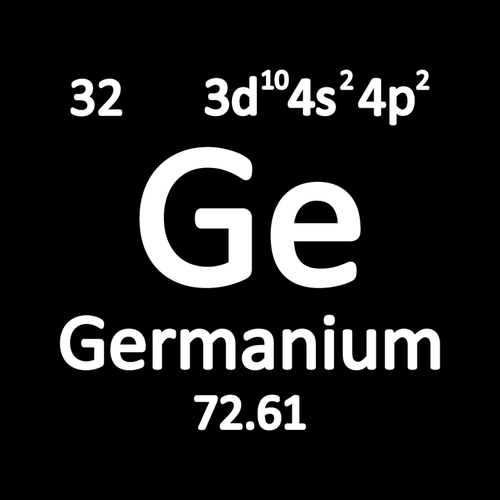
Germanium
Scientific names: Germanium, Ge, Atomic number 32, Bis-carboxyethyl germanium sesquioxide, Germanium lactate citrate
Alternate names: Carboxyethylgermanium Sesquioxide, Ge-132, Ge-Oxy 132, Germanio, Germanium-132, Germanium Inorganique, Germanium Organique, Germanium Sesquioxide, Inorganic Germanium, Numéro Atomique 32, Organic Germanium, Propagermanium, Sesquioxyde de Germanium, Spirogermanium
Actions: Analgesic properties, Anti-arthritic properties, Anticancer properties, Antimalarial properties, Antitumor properties, DNA, RNA, and protein synthesis, Hormonal, Immunological properties, Neuronal properties
Background
Germanium is a chemical element. People sometimes use it as medicine.
Despite serious safety concerns, germanium is used for cancer, heart disease, hepatitis, glaucoma, and other conditions. But there is no good scientific evidence to support these or other uses.
Despite serious safety concerns, germanium is used for cancer, heart disease, hepatitis, glaucoma, and other conditions. But there is no good scientific evidence to support these or other uses.
Safety Safety definitions
When taken by mouth: Germanium is LIKELY SAFE when taken in food amounts. A typical daily diet includes 0.4-3.4 mg of germanium.
Organic forms of germanium are POSSIBLY UNSAFE when taken by mouth. Spirogermanium and propagermanium are examples of organic forms of germanium. These forms can build up in the body and cause serious side effects including kidney failure, multi-organ dysfunction, lung toxicity, and nerve damage.
Inorganic (elemental) germanium is LIKELY UNSAFE. This includes certain compounds such as germanium oxide. There have been more than 30 reports of kidney failure and death linked with use of these forms of germanium. It builds up in the body and can damage vital organs such as the kidneys. It can also cause anemia, muscle weakness, nerve problems, and other side effects.
When given by IV: Organic forms of germanium are POSSIBLY UNSAFE when injected intravenously (by IV). Spirogermanium and propagermanium are examples of organic forms of germanium. These forms can build up in the body and cause serious side effects including kidney failure, multi-organ dysfunction, lung toxicity, and nerve damage.
Organic forms of germanium are POSSIBLY UNSAFE when taken by mouth. Spirogermanium and propagermanium are examples of organic forms of germanium. These forms can build up in the body and cause serious side effects including kidney failure, multi-organ dysfunction, lung toxicity, and nerve damage.
Inorganic (elemental) germanium is LIKELY UNSAFE. This includes certain compounds such as germanium oxide. There have been more than 30 reports of kidney failure and death linked with use of these forms of germanium. It builds up in the body and can damage vital organs such as the kidneys. It can also cause anemia, muscle weakness, nerve problems, and other side effects.
When given by IV: Organic forms of germanium are POSSIBLY UNSAFE when injected intravenously (by IV). Spirogermanium and propagermanium are examples of organic forms of germanium. These forms can build up in the body and cause serious side effects including kidney failure, multi-organ dysfunction, lung toxicity, and nerve damage.
Special Precautions & Warnings:
Pregnancy and breast-feeding: Germanium is LIKELY UNSAFE due to the risk for serious side effects, including death. Don't use it.Effectiveness
NatMed Pro rates effectiveness based on scientific evidence according to the following scale: Effective, Likely Effective, Possibly Effective, Possibly Ineffective, Likely Ineffective, Ineffective, and Insufficient Evidence to Rate.
Insufficient evidence Effectiveness definitions
- Cancer. Researchers are interested in spirogermanium, a form of germanium, as an alternative treatment for various kinds of cancer. But early research has shown only minimal response to treatment with spirogermanium. Other early research suggests that taking propagermanium, another form of germanium, by mouth for 1-7 months might benefit people with multiple myeloma, a type of blood cancer.
- Hepatitis B. Early research suggests that taking a specific product (Serocion, Yamanouchi, Japan) containing propagermanium by mouth for 16 weeks reduces the amount of active hepatitis virus in people with hepatitis B.
- A group of eye disorders that can lead to vision loss (glaucoma).
- Cataracts.
- Depression.
- Fatigue.
- Food allergies.
- Heavy metal poisoning.
- Heart disease.
- High blood pressure.
- High cholesterol.
- HIV/AIDS.
- Osteoarthritis.
- Pain.
- Swelling (inflammation) of the liver (hepatitis).Yeast infections.
- Viral infections.
- Weak and brittle bones (osteoporosis).
- Other conditions.
Dosing & administration
The appropriate dose of germanium depends on several factors such as the user's age, health, and several other conditions. At this time there is not enough scientific information to determine an appropriate range of doses for germanium. Keep in mind that natural products are not always necessarily safe and dosages can be important. Be sure to follow relevant directions on product labels and consult your pharmacist or physician or other healthcare professional before using.
Interactions with pharmaceuticals
It is not known if Germanium interacts with any medicines. Before taking Germanium, talk with your healthcare professional if you take any medications.
Interactions with herbs & supplements
There are no known interactions with herbs and supplements.
Interactions with foods
There are no known interactions with foods.
Action
Germanium might act against inflammation. It might also have antioxidant properties and affect the immune system.
vital.ly has licensed monographs from TRC Healthcare.
This monograph was last reviewed on 26/07/2022 20:00:35 and last updated on 05/12/2014 19:28:50. Monographs are reviewed and/or updated multiple times per month and at least once per year.
Natural Medicines disclaims any responsibility related to medical consequences of using any medical product. Effort is made to ensure that the information contained in this monograph is accurate at the time it was published. Consumers and medical professionals who consult this monograph are cautioned that any medical or product related decision is the sole responsibility of the consumer and/or the health care professional. A legal License Agreement sets limitations on downloading, storing, or printing content from this Database. No reproduction of this monograph or any content from this Database is permitted without written permission from the publisher. It is unlawful to download, store, or distribute content from this site.




